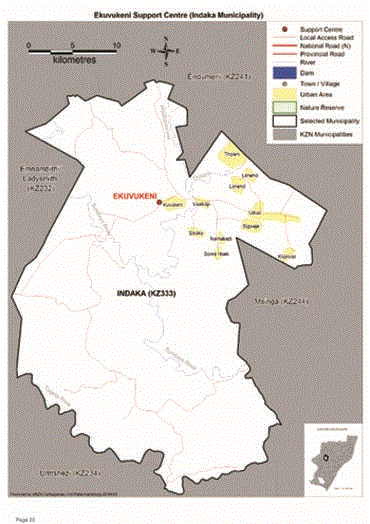Coordinator: Nombuso Ngcobo. Nombuso has worked for CCJ since 1998. 
Tel: 083 403 1526 (tel)
Email: Ekuvukeni.ccj@gmail.com
District: Uthukela Municipal District (Northern KwaZulu-Natal)
Area: 2,602 sq km
Population: 164,745
Most common cases: Legal advice and domestic violence
Areas served: The communities of Somsuku, Uitval, KwaHlathi, Elenge, Mhlumayo, Wesselsnek, Tholeni, Limehill, Wasbank, Helpmekaar, Ekuvukeni Township, and Emachunwini.

Description: Ekuvukeni is a rural township characterised by poor infrastructure and communities that are mostly under traditional leadership. The support centre (above) is housed in the traditional court of Inkhosi Kunene and is accessible to town and rural residents.
In 2011 the support centre dealt with 91 cases, with the most common being legal advice (61).
Nombuso Ngcobo

How long have you worked for CCJ?
Since 1998
What led you to work for CCJ?
My father was a businessman and I used to work for him. He taught me how to work with desperate and poor people and to talk and listen to them. I learned that I like to work for the community and to empower people about the law. I have fulfilled my dream by working for the CCJ.
What are the most common types of cases that you deal with?
They are legal advice, such as death benefits, social problems like children taking drugs, and child abuse, including emotional abuse.
How do you deal with these problems?
| "I have fulfilled my dream by working for CCJ." |
With legal advice we make sure the client gets the right documents to claim death benefits after a spouse has died. With juvenile problems, we invited the children and parents in and address them about drugs and other issues.
Is there a law that you would like to see changed?
Yes, in child abuse cases I would say that there shouldn’t be any bail. Sometimes the accused is out on bail and intimidates the child’s family. Also, a child should not have to testify in front of the accused, but should do so in front of a camera instead. 
Have you noticed the people’s attitudes have changed since you have worked in Ekuvekeni?
Yes, some men have changed their attitudes. They have stopped being so violent and abusive to their girlfriends and wives, and more of them come to my office now to ask for help.
Do you ever use customary laws to solve problems?
Not often, buy there was a case where a boy insulted someone and they wanted compensation. I arranged for mediation and in the end the boy agreed to pay damages of a goat.
What advice would you give to children growing up in Ekuvekeni?
I would say abstain from sex and stay away from drugs, and crime doesn’t pay.
Do you have a role model you could tell us about?
My role model is my director Winnie Kubayi. I am very proud of her, she is so brilliant and clever. What I am is because of her organisation.
What are the main challenges that you face in your day-to-day work?
We don’t have enough office equipment, like a computer to write out our case reports on, a copier, phone and electricity.
Is there a particular case that you could share that you found especially satisfying?
There was a man whose son was buried in Johannesburg. According to traditional custom, all the family have to be buried together so that they can be close to eachother after death. He wanted the body to be exhumed. I managed to argue according to the human rights of the man that the son’s body had to be moved to this area (Ekuvukeni). And the body was brought here.